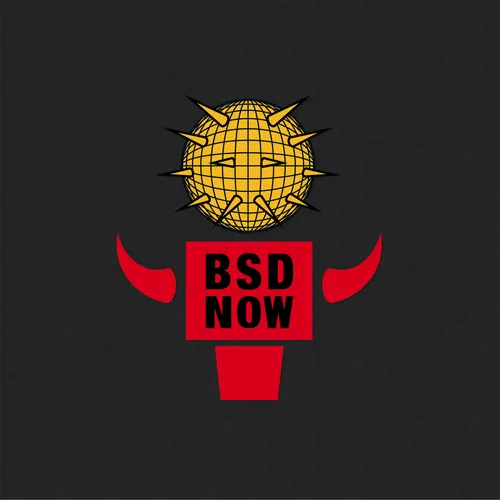187: Catching up to BSD
- Author
- JT Pennington
- Published
- Wed 29 Mar 2017
- Episode Link
- https://www.bsdnow.tv/187
Catching up to BSD, news about the NetBSD project, a BSD Phone, and a bunch of OpenBSD and TrueOS News.
This episode was brought to you by

href="http://www.digitalocean.com/" title="DigitalOcean">
href="http://www.tarsnap.com/bsdnow" title="Tarsnap">
Headlines
NetBSD 7.1 released
- This update represents a selected subset of fixes deemed important for security or stability reasons, as well as new features and enhancements.
Kernel
- compat_linux(8): Fully support sched_setaffinity and sched_getaffinity, fixing, e.g., the Intel Math Kernel Library.
DTrace:
- Avoid redefined symbol errors when loading the module.
- Fix module autoload.
IPFilter:
- Fix matching of ICMP queries when NAT'd through IPF.
- Fix lookup of original destination address when using a redirect rule. This is required for transparent proxying by squid, for example.
- ipsec(4): Fix NAT-T issue with NetBSD being the host behind NAT.
Drivers
Security Fixes
- NetBSD-SA2017-001 Memory leak in the connect system call.
- NetBSD-SA2017-002 Several vulnerabilities in ARP.
ARM related
- Support for Raspberry Pi Zero.
- ODROID-C1 Ethernet now works.
Summary of the preliminary LLDB support project
What has been done in NetBSD
- Verified the full matrix of combinations of wait(2) and ptrace(2) in the following
- GNU libstdc++ std::call_once bug investigation test-cases
- Improving documentation and other minor system parts
- Documentation of ptrace(2) and explanation how debuggers work
- Introduction of new siginfo(2) codes for SIGTRAP
- New ptrace(2) interfaces
What has been done in LLDB
Native Process NetBSD Plugin
The MonitorCallback function
Other LLDB code, out of the NativeProcessNetBSD Plugin
Automated LLDB Test Results Summary
Plan for the next milestone
- fix conflict with system-wide py-six
- add support for auxv read operation
- switch resolution of pid -> path to executable from /proc to sysctl(7)
- recognize Real-Time Signals (SIGRTMIN-SIGRTMAX)
- upstream !NetBSDProcessPlugin code
- switch std::call_once to llvm::call_once
- add new ptrace(2) interface to lock and unlock threads from execution
- switch the current PT_WATCHPOINT interface to PT_GETDBREGS and PT_SETDBREGS
Actually building a FreeBSD Phone
- There have been a number of different projects that have proposed building a FreeBSD based smart phone
- This project is a bit different, and I think that gives it a better chance to make progress
- It uses off-the-shelf parts, so while not as neatly integrated as a regular smartphone device, it makes a much better prototype, and is more readily available.
- Hardware overview: X86-based, long-lasting (user-replaceable) battery, WWAN Modem (w/LTE), 4-5" LCD Touchscreen (Preferably w/720p resolution, IPS), upgradable storage.
- Currently targeting the UDOO Ultra platform. It features Intel Pentium N3710 (2.56GHz Quad-core, HD Graphics 405 [16 EUs @ 700MHz], VT-x, AES-NI), 2x4GB DDR3L RAM, 32GB eMMC storage built-in, further expansion w/M.2 SSD & MicroSD slot, lots of connectivity onboard.
- Software: FreeBSD Hypervisor (bhyve or Xen) to run atop the hardware, hosting two separate hosts.
- One will run an instance of pfSense, the "World's Most Popular Open Source Firewall" to handle the WWAN connection, routing, and Firewall (as well as Secure VPN if desired).
- The other instance will run a slimmed down installation of FreeBSD. The UI will be tweaked to work best in this form factor & resources tuned for this platform. There will be a strong reliance on Google Chromium & Google's services (like Google Voice).
- The project has a detailed log, and it looks like the hardware it is based on will ship in the next few weeks, so we expect to see more activity.
***
News Roundup
NVME M.2 card road tests (Matt Dillon)
- DragonFlyBSD’s Matt Dillon has posted a rundown of the various M.2 NVMe devices he has tested
- SAMSUNG 951
- SAMSUNG 960 EVO
- TOSHIBA OCZ RD400
- INTEL 600P
- WD BLACK 256G
- MYDIGITALSSD
- PLEXTOR M8Pe
- It is interesting to see the relative performance of each device, but also how they handle the workload and manage their temperature (or don’t in a few cases)
- The link provides a lot of detail about different block sizes and overall performance
***
ZREP ZFS replication and failover
- "zrep", a robust yet easy to use ZFS based replication and failover solution. It can also serve as the conduit to create a simple backup hub.
- The tool was originally written for Solaris, and is written in ksh
- However, it seems people have used it on FreeBSD and even FreeNAS by installing the ksh93 port
- Has anyone used this? How does it compare to tools like zxfer?
- There is a FreeBSD port, but it is a few versions behind, someone should update it
- We would be interested in hearing some feedback
***
Catching up on some TrueOS News
- TrueOS Security and Wikileaks revelations
- New Jail management utilities
- Ken Moore's talk about Sysadm from Linuxfest 2016
- The Basics of using ZFS with TrueOS
***
Catching up on some OpenBSD News
- OpenBSD 6.1 coming May 1
- OpenBSD Foundation 2016 Fundraising (goal: $250K actual: $573K)
- The OpenBSD Foundation 2017 Fundraising Campaign
- OpenBSD MitM attack against WPA1/WPA2
- OpenBSD vmm/vmd Update
***
Beastie Bits
- HardenedBSD News: Introducing CFI
- New version of Iocage (Python 3) on FreshPorts
- DragonFly BSD Network performance comparison as of today
- KnoxBUG recap
***
